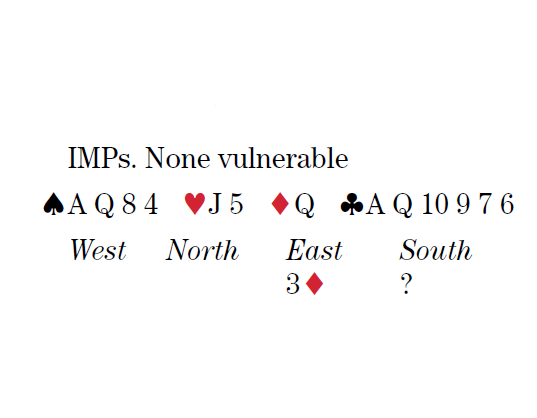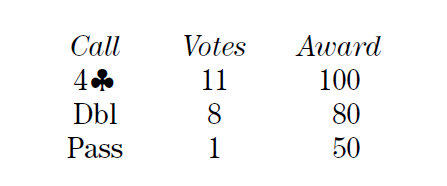
What’s your call?
| 3♥ | 3♠ | 3NT | ||
| 4♣ | 4♦ | 4♥ | 4♠ | 4NT |
| 5♣ | 5♦ | 5♥ | 5♠ | 5NT |
| 6♣ | 6♦ | 6♥ | 6♠ | 6NT |
| 7♣ | 7♦ | 7♥ | 7♠ | 7NT |
| Dbl | Pass |
Equal-level conversion disorder
Yet again, an opponent’s disruptive preempt has mucked up what surely should have been our auction. More than half the field opts to bid 4♣ as the lesser evil.
“When in doubt, bid your longest suit,” advises Robinson. “If I doubled, partner would probably bid hearts, even with a diamond stopper.”
“This hand is just too good to pass,” agree the Joyces, “although 4♣ doesn’t bring spades into the picture.”
“I’m not crazy about 4♣,” says Falk, “but I’ve got shortness in diamonds and a fair hand, so if we belong in the auction, I’m the one who has to enter.”
Kennedy nods. “4♣. I don’t consider my hand big enough to double first and try to show clubs if partner bids hearts.”
Colchamiro objects to doubling because of ♥J x. “Doubling and then bidding 4♣ over 3♥ is going way too far to show shorter spades and longer clubs. Over 4♣, if partner cuebids 4♦, I’ll give him 4♠; if 3NT, pass; if 3♥, I’ll decide between 4♥, 4♦ and 3♠.”
The Sutherlins agonize: “Too good to pass, too short in hearts to double. Only 4♣ remains.”
For Weinstein, doubling is the least evil. “Bidding 4♣ is most natural, but I hate blowing by 3NT and taking spades out of the picture.”
“I don’t love double,” says Meckstroth, “but lots of good things could happen. Partner could pass, bid 3NT, bid 4♦ — all of those are great. If he bids hearts, I will have to guess to pass or bid clubs.”
Stack’s double caters to 3NT, spades, a penalty pass and even clubs by partner. “Because we must take action with this hand, a 4♣ bid caters only to clubs. If partner jumps to 4♥, who’s to say we won’t make it?”
“Anything could be right,” says Meyers, who doubles. “I hope that if partner bids 3♥, my 3♠ bid would imply spades and clubs and not a strong one-suiter in spades.”
“Maybe for once in his life, partner will do something other than bid hearts,” sighs Cohen. “If he does, I’ll hope that we are using equal-level conversion doubles whereby a takeout double followed by clubs doesn’t follow the traditional meaning of the ‘big double.’ This goes against all of the advice I gave in my Bulletin series on doubles last year. I’m sure to confuse all my students.” What’s most confusing is that correcting 3♥ to 4♣ isn’t equal level. Does that matter?
Hampson doubles on the chance he’ll “catch a black suit or a cuebid for a choice. But I am prepared to correct hearts to clubs in the hope that we have a home or a game. Option two would be pass.”
Rigal cannot stand to pass. He’ll convert 3♥ to 4♣ and sit for 4♥. “I have secret admiration for anyone who bids 3NT or passes — which could well be right, I suppose!”
Lawrence doesn’t mind passing. “The most obvious bid is 4♣. But if successful, all you get is 130. You need partner to have a lot to make a game and you are entitled to hope for 7 or 8 decent points on average. Annoyingly, if you bid 4♣, you can’t get to 3NT, which could be your best spot. Double is dangerous because partner will tend to bid hearts, leaving you with a worse problem. Finally, 3♠ might work if you get lucky and find support. But if it is just three-card support or worse, it will be hard on you. Passing rates to be best. Mind you, all is not lost. It may get around to partner, and if he bids 3♥, you will still have a problem, but it will be a more pleasant problem.”

